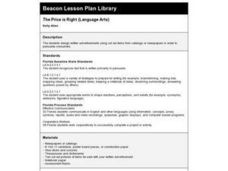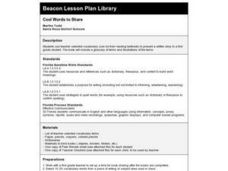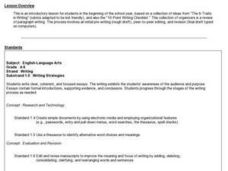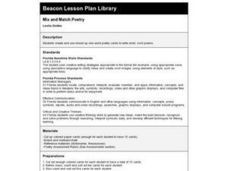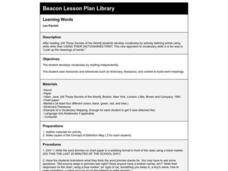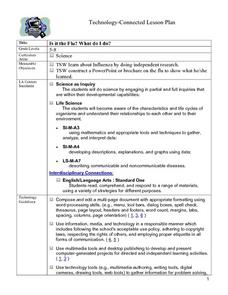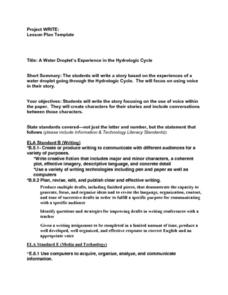Curated OER
Writing Similes
Fifth graders identify and write similes. They define simile and discuss different examples, and with the help of a thesaurus, write original similes that compare the colors of crayons to objects or feelings. Students copy their rough...
Curated OER
Homophones and Vivid Verbs
Students define and practice using synonyms, antonyms, homonyms, and homophones in complete sentences, paragraphs and essays. They include "vivid verbs" in their writing with the aid of a dictionary or thesaurus.
Curated OER
Rooting One's Way To Meaning
Students use a thesaurus on the internet to explore the meanings of Greek and Latin roots. They find definitions of given words, draw a concept map for root words, and write four synonyms for each word. Students discover how Latin and...
Curated OER
The Price is Right - Advertisements
Fourth graders design written advertisements using cut out items from catalogs or newspapers in order to persuade consumers.
Curated OER
Cool Words to Share
Fifth graders use teacher-selected vocabulary to present a written story to a first grade student. The book include a glossary of terms and illustrations of the terms. This is a great lesson for big/little buddies to do together!
Curated OER
"All About Me" Paragraph
Fifth graders write a paragraph titled "All About Me" in the computer lab after they have drawn graphic organizers to fill in background information about themselves and used a "10-Point Writing Checklist" to do peer editing.
Curated OER
Descriptive Drawings - Pen and Ink - Art with Text
Students create a pen and ink drawing using words to determine values choosing a work with high emotional content and incorporating words that describe the picture's content placing words together tighter, made bolder, etc. to achieve...
Curated OER
Encyclopedia Introduction
Second graders demonstrate how to use reference materials. In this library media lesson, 2nd graders are introduced to the encyclopedia and are shown how to use the encyclopedia as a reference. Students use encyclopedias to complete a...
Curated OER
What is a Dictionary?
Second graders explore the purpose of a dictionary. In this library media lesson, 2nd graders explore My First Dictionary and identify guidewords, entry words, and captions. Students list ways they can use the dictionary.
Curated OER
Description and Modifying: What's On Your Plate?
Students create a food product and an advertisement promoting it. In this description and advertising lesson, students read children's book for inspiration and discover advertising techniques. Students complete their ads and...
Curated OER
Acronym Names
Pupils create an acronym out of their name. They use a thesaurus and the computer to create it. They also add pictures to make it more creative.
Curated OER
Parts of Speech: Active Verbs
Students use White Fang to help them study active verbs. In this grammar lesson plan, students define active verbs and find examples in the the novel White Fang. Students then use ProQuest to research a place they'd like to visit....
Curated OER
We Thank You, Veteran!
Fifth graders use information from videos, picture books, and relatives' military backgrounds to write a short or extended message of gratitude on a greeting card for local veterans.
Curated OER
Mix and Match Poetry
Third graders compare boring and vivid words: adjectives, adverbs, and verbs. They list them and come up with 10 vivid words on cards. They shuffle all the cards and use 10 to write "vivid" poetry.
Curated OER
Learning Words
Students listen to Jane Yolen's, All Those Secrets of the World. They engage in activities to find word meanings without using a dictionary. They practice using a vocabulary mapping handout.
Curated OER
Amazing Adjectives
Fourth graders compose sentences that use descriptive adjectives to describe a specific food and day that they both like and dislike. They should really enjoy coming up with words that describe their favorite and least favorite foods!
Curated OER
Is It The Flu? What Do I Do?
Learners use the internet to research the flu. Using various websites, they identify who should get flu shots, how to protect themselves and guidelines for getting over the flu. They write a one page report on their findings to end the...
Curated OER
Common/Proper Nouns
Students sort word card into two categories (common and proper nouns). They copy the class charts. Students create a table in Word including the headings, common noun and proper noun. They put the correct words onto their chart and add a...
Curated OER
A Water Droplet's Experience in the Hydrologic Cycle
Students write a story from the perspective of a water droplet on a journey through the water cycle. They use the 6+1 Traits writing method to focus on voice in the writing as they create characters that their water droplet has...
Curated OER
The Poet's Message-"The Colored Soldier" by Langston Hughes
Young scholars analyze the poem, "The Colored Soldier" by Langston Hughes to gain a greater experience of how poets use language to create meaning, influence thinking and thus become pioneers of change in American society. They work on...
Curated OER
Book Search
Fourth graders are introduced to how to use the Dewey Decimal System in libraries. After taking a pre-test, they complete a worksheet in which they determine the location of different books on the internet and on the shelf. To end the...
Curated OER
Exploring Color Vocabulary
Students explore color terms and related meanings and metaphors in cultural and literary contexts. They use the main colors to explore synonymous color terms and related metaphorical meanings of color words. Students recognize the...
Curated OER
Glossary, Index, and Table of Contents
Fourth graders use two separate sources to learn about index, glossary, and table of contents usage. In this library lesson, 4th graders use two books, Learning About Weather with Graphic Organizers, and The World Almanac for Kids, to...
Curated OER
Every Dog Has Its Day
Students explore the use of imagery in writing. For this writing lesson, students create a writing piece that features sensory images without resorting to the use of clichés.





